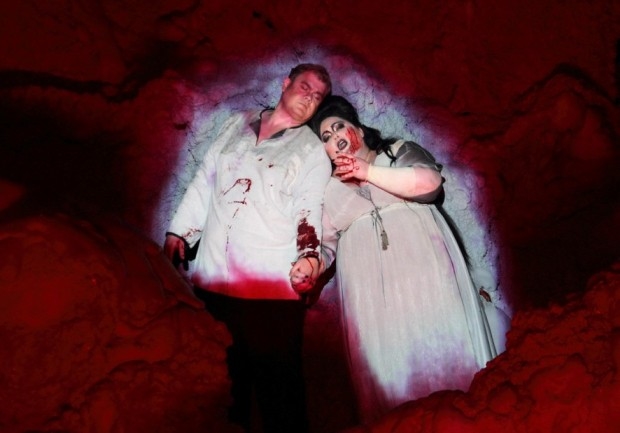Tristan and Isolde (London Coliseum)
English National Opera’s new artistic director scales one of the repertoire’s greatest peaks

© Catherine Ashmore
Friends, countrymen, I come to praise ENO, not to bury it. But goodness, they make it difficult.
New artistic director Daniel Kramer has expressed a desire to revive the best of the company's past work alongside new productions. Bravo. He could do worse than start with David Alden's cerebral 1996 Tristan and Isolde, still the most potent vision of the piece I've seen. For now, instead, we have this new staging by Kramer himself: three ill-matched acts bound together by a questionable sense of theatre.
Isolde, sworn enemy of Tristan, falls in love with him, and he with her, when a death draught is switched with a love potion. Far from solving their problems, this error compounds matters because Isolde is betrothed to Tristan's own liege, King Marke. It can only end badly, and after four hours of stage time it does.
The composer jettisoned opera's customary recitatives and arias in favour of stream-of-consciousness exposition and erotically charged climaxes; but Kramer, for all his left-field ideas, is too conservative to embrace all this on its own terms. Instead he deals in literal things like actions and reactions, so that his solution to King Marke's lengthy rebuke scene is to strap Tristan and Isolde onto asylum beds—a handy move that saves him having to direct silent singers.
Musically, this new production of Tristan is mostly blest. Former music director Edward Gardner returns to conduct an expansive, symphonically-shaped account of Wagner's score that's as profound as the staging is meretricious. The ENO Orchestra is on transcendent form for its old boss, and there's a sublime cor anglais solo from Helen Vigurs in act three.
Karen Cargill and Craig Colclough somehow project inner dignity as the servants Brangäne and Kurwenal, despite being decked out like grotesques from Glyndebourne's Saul (and in Colclough's case, being asked to play the clown). Each sings with controlled intensity and dynamic sensitivity. And bass Matthew Rose is magnificent as a biblical King Marke, a simple man whose feelings are hamstung by formality and gravitas.
'What ENO needs is a revivable hit'
As Isolde, Heidi Melton's plangently affecting middle register is compromised by uncertain security above the stave, with a tendency at volume to the occasional shriek, and she only just lasts the course during the Liebestod. Her Tristan is Stuart Skelton, so we're in the safest possible hands. He brings an engagement with character that makes one long to hear him in a concert account where we can paint our own scenery.
Instead, we have Kramer. The first act is odd, and clearly directed from a desk in the centre stalls. Brangäne spends most of its 80 minutes strapping Isolde into a farthingale, while on the far side of the stage (and barely visible from my seat on the extreme left) Tristan dons his armour. Then they drink the potion and kick it all off again. There's a side-plot about self-harm, but it's barely followed through.
Act two is Acorn Antiques in a cave with Brangäne as Mrs Overall, and when Melton and Skelton essay a miniature love dance it's as if Victoria Wood is smiling down. There's a comedy syringe too. In act three, though, once Kurwenal's funny stuff is dispensed with, Kramer begins to find the opera's beating heart. Too late.
Anish Kapoor's much-heralded designs range from the untheatrical (act one) through the functional (act two) to the inspired (act three, where they're enhanced by Paul Anderson's moody lighting and terrific projection effects by Frieder Weiss), but they're not enough to save the show from itself.
It's not only the opera that's a tragedy, because what ENO sorely needs at this time is a revivable hit. That's been a lesson slow in the learning. And when the world's leading Heldentenor is prepared to relearn the summit of his repertoire in English solely for your house, you owe him better than this.
Tristan and Isolde runs in repertory at the London Coliseum until 9 July.












